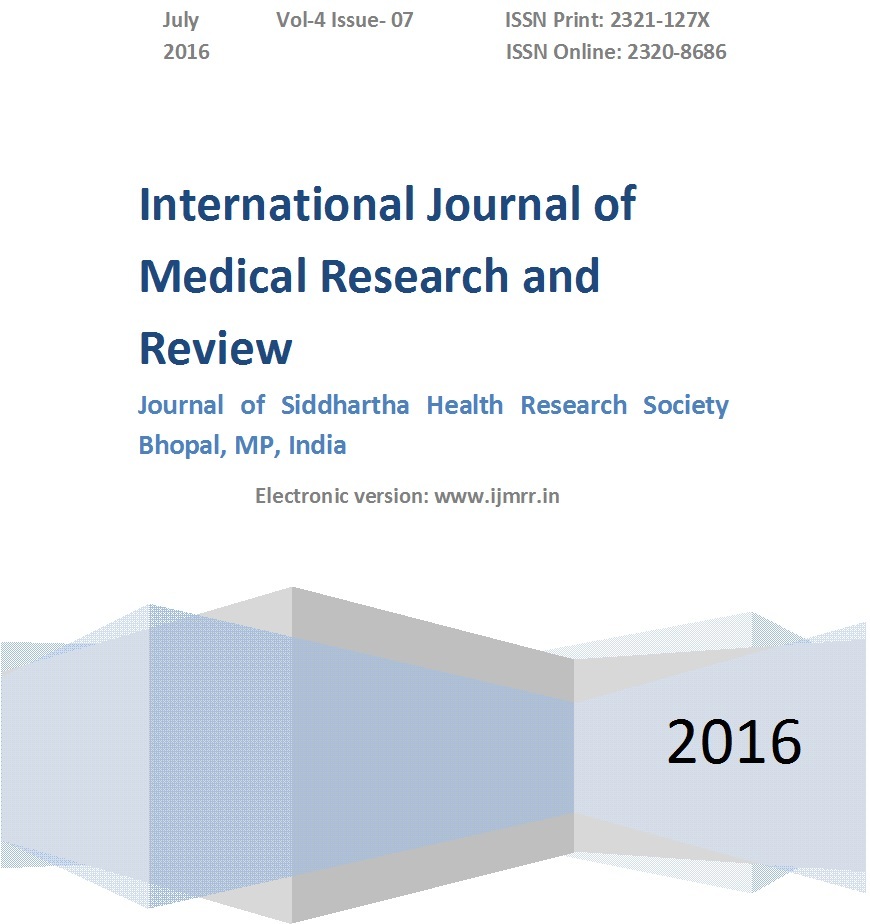Effect of exposure of cotton dust on pulmonary function tests in female workers of spinning mill at Malegaon, Maharashtra
Abstract
Background: Textile industry is the only industry to have employed women workers since long time. There are many respiratory problems develop in the women workers.
Aims and Objective: The aim of this study was to assess the effects of exposure of cotton dust on the pulmonary function in the spinning mill female workers.
Method: We enrolled 35 female (age=18 to 50 years) workers in study group who were regularly working in spinning mill and duration of exposure to cotton dust was noted. Inclusion criteria were clinically healthy, non-smokers, without chronic respiratory disease, systemic illness. Tobacco users were excluded. Control group consist 35 female (age=18 to 50 years) who were never in exposure of cotton wool. This study was conducted after obtaining ethical clearance and consent. MEDSPIROR-COMPUTERISED SPIROMETER was used to find out pulmonary function tests which were FVC, FEV1, FEV1/FVC and PEFR, which helped in evaluating pulmonary functions.
Statistical Analysis: Unpaired students ‘t’ test was applied to compare the PFT parameters in study group and control group . The data was expressed as mean + standard deviation.
Results: Greater declines were seen in forced vital capacity, forced expiratory volume in first second. This reduction was significant in FEV1/FVC which is indicator of early obstructive pattern in the exposed group. As duration of exposure increases FVC reduces and showed restrictive pattern.
Conclusion: According to our study, cotton textile workers developed respiratory problems which reflects as reduces pulmonary function.
Downloads
References
Sherly Thomas; A Study on the Health Problems of Women Working in a Textile Unit in Coimbatore International Journal of Science and TechnologyVolume 1 No.5, November 2011
Siziya S, Munalula B, Respiratory conditions among workers in a cotton spinning mill in Zambia,ATDF Journal Volume 2, Issue 3;2005.http://www.atdforum.org/IMG/pdf/Respiratory_conditions-_Cotton_mills.pdf.
Standardization of Spirometry, 1994 Update. American Thoracic Society. Am J Respir Crit Care Med. 1995 Sep;152(3):1107-36.doi: https://doi.org/10.1164/ajrccm.152.3.7663792.
PRABHAKARA RAO.K, SRINIVASARAO.CH, SUMANGALI, A STUDY OF PULMONARY FUNCTIN TESTS IN COTTON MILL WORKERS OF GUNTUR DISTRICT Bulletin of Pharmaceutical and Medical Sciences (BOPAMS) A Peer Reviewed International Journal Vol.1.Issue.3.;2013
Saadat Ali Khan Aizasaadia .pulmonary function studies in Pakistani cotton ginners.Pak J Physiol 2006;2(1). http://pps.org.pk/PJP/2-1/saadat.pdf.
Wang XR, Zhang HX, Sun BX, Dai HL, Hang JQ, Eisen EA, Wegman DH, Olenchock SA, Christiani DC. A 20-year follow-up study on chronic respiratory effects of exposure to cotton dust. Eur Respir J. 2005 Nov;26(5):881-6.doi: https://doi.org/10.1183/09031936.05.00125604.
Glindmeyer HW, Lefante JJ, Jones RN, Rando RJ, Abdel Kader HM, Weill H. Exposure-related declines in the lung function of cotton textile workers. Relationship to current workplace standards. Am Rev Respir Dis. 1991 Sep;144(3 Pt 1):675-83.doi: https://doi.org/10.1164/ajrccm/144.3_pt_1.675.
Ramaswamy, P; Sambandam, S; Ramalingam, A; Arnold, J; Balakrishnan, K F; Thanasekaraan, V. Pulmonary Functions of Workers in Textile Units of Tamilnadu, India: Isee-386. Epidemiology 2003 sep 14(5)supplement s76.
Bakirci N, Kalaca S, Francis H, Fletcher AM, Pickering CA, Tumerdem N, Cali S, Oldham L, Niven R. Natural history and risk factors of early respiratory responses to exposure to cotton dust in newly exposed workers. J Occup Environ Med. 2007 Aug;49(8):853-61.doi: https://doi.org/10.1097/jom.0b013e3180dca598.
Nagoda M, JU Okpapi, M Babashani. Assessment of respiratory symptoms and lung function among textile workersat Kano Textile Mills, Kano, Nigeria? Nigerian Journal of Clinical Practice 2012;15.doi: http://www.njcponline.com/text.asp?2012/15/4/373/104505.
Jiang CQ, Lam TH, Kong C, Cui CA, Huang HK, Chen DC, He JM, Xian PZ, Chen YH. Byssinosis in Guangzhou, China. Occup Environ Med. 1995 Apr;52(4):268-72.doi: https://doi.org/10.1136/oem.52.4.268.
Fishwick D, Fletcher AM, Pickering CA, McL Niven R, Faragher EB. Lung function in Lancashire cotton and man made fibre spinning mill operatives. Occup Environ Med. 1996 Jan;53(1):46-50.doi: https://doi.org/10.1136/oem.53.1.46.
Chattopadhyay BP, Saiyed HN, Mukherjee AK. Byssinosis among jute mill workers. Ind Health. 2003 Jul;41(3):265-72.doi: https://doi.org/10.2486/indhealth.41.265.
Wang X, Zhang HX, Sun BX, Dai HL, Hang JQ, Eisen E, Su L, Christiani DC. Cross-shift airway responses and long-term decline in FEV1 in cotton textile workers. Am J Respir Crit Care Med. 2008 Feb 1;177(3):316-20. Epub 2007 Nov 1.doi: https://doi.org/10.1164/rccm.200702-318oc.
V.S.Dhanashree Naidu,V.S.SaiSankalp Naidu et al 2014, .Effect of cotton dust on pulmonary function among cotton textile workers MRIMS Journal of health science,volume 2 ,issue 2,july-december 72-77).
Tiwari RR, Zodpey SP, Deshpande SG, Vasudeo ND. Peak expiratory flow rate in handloom weavers. Indian J Physiol Pharmacol. 1998 Apr;42(2):266-70.
Boezen HM, Schouten JP, Postma DS, Rijcken B. Relation between respiratory symptoms, pulmonary function and peak flow variability in adults. Thorax. 1995 Feb;50(2):121-6.doi: https://doi.org/10.1136/thx.50.2.121.



 OAI - Open Archives Initiative
OAI - Open Archives Initiative


